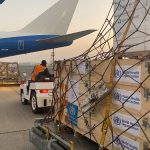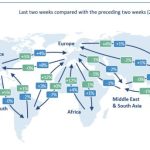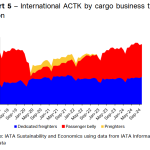United Cargo The belly-carrier trailblazer
With United States Postal Service (USPS) as one of its largest customers, United Cargo operates 4,000 flights daily in the US for domestic mails alone and an additional 1,500 flights for international routes. While the majority of its air cargo services are provided to commercial businesses, freight forwarders, logistics firms and national postal services, the company is eyeing a global-connectivity expansion, mainly through Southeast Asia.
By Mohammad Laique Khan
United Cargo, the airfreight division of United Airlines, the largest airline in the world, continues to be the leading US-based air cargo belly-carrier, transporting billions of cargo-ton miles annually to hundreds of global destinations across six continents.
Focusing on quality, innovation and customer satisfaction, the cargo carrier is an industry trailblazer, tranforming air cargo for the better, especially for best value.
Jan Krems, President of United Cargo, shares his insights about the company’s missions, innovations, sustainable and flexible solutions as well as smart technologies that help businesses, communities and economies meet the challenges of today’s more globalized digital world.
Krems is responsible for all aspects of United Cargo’s operations, customer service, sales and marketing activity, revenue management, product quality, and technology solutions. Prior to this position, he was with Air France-KLM-Martinair Cargo for 27 years, climbing up the corporate ladder to reach the role of Vice President Americas, where he was responsible for the company’s operations, customer service and sales in North America, South America, Latin America, Canada and the Caribbean.
Krems is an economics graduate from Utrecht University in the Netherlands with a post-graduate degree in marketing. Under his leadership, United Cargo is eyeing expansion on emerging markets while leading United Airlines’ air cargo division in spearheading a more modernized industry.
Read on the rest of Air Cargo Update’s interview with Krems, the air cargo and logistics expert, who enjoys growing grapes and turning them into wine.
Could you please provide an overview of your role at United Cargo and your key objectives for the company?
I am Jan Krems, President of United Cargo. Over the past three decades, I have had the privilege of working in the dynamic world of air cargo and logistics. My passion has always been about connecting people, businesses, and communities through innovative and reliable supply chain solutions. In my current role, I am responsible for all aspects of United Cargo’s operations, customer service, sales and marketing activity, revenue management, product quality, and technology solutions.
At United Cargo, our primary goal is to be profitable and customer-focused. We are committed to doing the right thing and providing a high-quality product. A major part of our strategy is ensuring that 50% to 55% of our shipments are specialty products. By focusing on specialty products, we create stronger relationships with our customers—because when you offer something unique, customers are less likely to switch for a small price difference.
Quality is a top priority for us. We strive for excellence in everything we do, and the feedback we receive from our customers reflects that commitment. Moreover, safety is equally important in all aspects of our operations. Our ultimate goal is to be the best value cargo carrier in the world. We are already the biggest, and we are focused on maintaining that position while continuing to grow.
The US market has undergone significant changes over the years. What opportunities do you foresee in the coming years?
That’s a big question, and it depends heavily on global developments. For instance, we need to watch what happens politically and economically. I don’t know what direction policies will take once there is change of government in the White House. The state of key shipping routes, such as the Red Sea or the Panama Canal, could also significantly impact ocean freight. Strikes and disruptions in freight logistics are another factor to consider.
As for e-commerce, while I recognize its importance, it’s not our primary focus. With the resources and capacity we currently have—especially on routes like Asia—I prioritize serving existing customers. Their satisfaction globally takes precedence, and only if there’s extra capacity do we accommodate e-commerce in future.
Pharmaceuticals, on the other hand, are a core focus for us. We maintain strong relationships with shippers to better understand their needs and ensure they are aware of what we can offer. However, we don’t deal directly with shippers when it comes to rates and agreements. Instead, we operate through forwarders or triangular agreements. Building strong communication with shippers is still critical because mutual understanding helps us evolve and serve them better.
Growth in the US market is definitely achievable, but it varies regionally. Some months, the East Coast performs better than the West Coast, or the Midwest outpaces the South. There’s untapped potential across all these regions.
Domestically, we also focus on opportunities like e-commerce and partnerships with entities like the United States Postal Service (USPS), which is one of our largest customers. For domestic mail alone, we operate 4,000 flights daily, with an additional 1,500 flights for international routes.
Being the largest airline in the world, our responsibility is to connect all key points globally and fill the gaps effectively to maintain and grow our market position.
What are the key emerging markets for United Cargo?
Asia is definitely a growing market for us. Before the pandemic, we were running about 14 flights a day out of China, but now it’s down to around 14 a week, mostly due to the political tensions between the Chinese and U.S. governments. Hopefully, things will improve soon.
However, we have seen progress in some Asian markets. For example, we are back to flying to Hong Kong four times a week and Taiwan twice a day, and our operations in Korea are also up and running. That said, we are always looking for more capacity.
Other strong markets include Vietnam and Thailand. We are making interline deals with other reputable carriers that share our approach and values, but instead of SPA agreements, these are more about capacity agreements. These agreements allow us to send cargo from those markets to the U.S. and bring shipments to our hubs, like in Japan. We have got 14 flights a day to Japan, and from there, we can route cargo to the US.
As for freighters, we don’t actually own any, but we do lease capacity. For instance, we have a freighter flying between Newark and Tel Aviv for a customer, and another flying from Colombia to Miami and Bogota. We also have a dedicated APA freighter that makes daily trips to Micronesia carrying mail. These flights are scheduled, but again, we lease the freighters, we don’t own them.
Can you elaborate on the recent innovations, products, and solutions United Cargo has introduced to meet the evolving demands of the market and sustain growth in the cargo sector?
United Cargo has been focused on aligning its innovations and solutions with the evolving needs of the market. For example, in pharmaceuticals, we have prioritized having the right infrastructure, such as temperature-controlled facilities at all our airports, specialized containers, and well-trained teams to handle sensitive shipments.
In terms of connectivity, we have been enhancing our direct customer interactions and improving host-to-host capabilities. Our booking platform has significantly advanced, and we are collaborating with platforms like Cargo.One and WebCargo to strengthen our digital presence. Interestingly, we also realized that because we were slower to adopt full digitalization, many of our customers still appreciate the direct, personal interactions we provide.
We handle about 2 million bookings annually. For smaller shipments under 100 kilograms, automation is key to simplifying the process. Pre-allocated bookings make up 25%, while another 25% involves more complex shipments that require personalized attention. This balanced approach ensures efficiency and customer satisfaction.
While we initially lagged in digitalization, I have come to realize it gave us the opportunity to refine our strategy, adapt thoughtfully and align our approach with what our customers really value.
Among all verticals, which would you consider the most effective or strategic to focus on?
For us, the pharmaceutical vertical stands out. It’s where we excel and lead by a significant margin. When we engage with our customers—like Pfizer, for example, which is a major partner of ours—we focus on building and maintaining strong, collaborative relationships. In this case, we work closely with our forwarders to ensure seamless operations and mutual satisfaction.
This partnership with Pfizer is more than just a business transaction; it’s a long-term alliance built on trust and mutual dependency. Neither of us can simply walk away—it’s a synergy that’s designed to thrive over time.
Could you share your achievements in digitalization so far? Additionally, how do you envision progressing toward your goals in this area?
We have made some solid progress in 2024 and plan to build on that momentum in 2025. That said, we are mindful of our limited resources, so our pace has to be measured, and we can’t take on everything at once.
Our team has been doing a fantastic job ensuring we stay on track with our digitalization efforts. While we are not leading the field just yet, we are focused on making thoughtful, strategic decisions that align with what’s feasible for us. It’s about finding the right balance and seeing what works best given our current capacity.
With such a wide range of verticals and significant cargo volumes, how do you collaborate with airports and logistics partners to address infrastructure challenges?
Collaboration is a key focus for us. We have strong partnerships with our joint venture allies, like ANA— though their merger with NCA has temporarily put some initiatives on hold. Similarly, with Lufthansa, we seek opportunities to align operations. Recently, we have been working very closely with Emirates, particularly in the pharmaceutical segment, identifying ways to combine our strengths effectively.
Beyond airlines, we actively partner with all stakeholders at airports. This includes trucking firms, handling providers, sales teams, and other key players. Our approach ensures that all parts of the supply chain are interconnected and operate as one integrated system to avoid any gaps or disconnects.
Could you share the sustainability initiatives undertaken by United Cargo?
Sustainability is at the heart of United Cargo’s operations. Our focus on initiatives like Sustainable Aviation Fuel (SAF) reflects our commitment to reducing carbon emissions in a meaningful way.
For our CEO, sustainability isn’t just a buzzword or a marketing tactic—it’s a fundamental part of how we operate. He truly believes in leading the charge to make United Cargo a carbon-neutral organization. While many companies set ambitious goals for the future, we focus on practical, collaborative actions that involve every part of the logistics chain. It’s not just about airlines or forwarders; everyone has a role to play in creating a cleaner, more sustainable world.
At United Cargo, sustainability is more than a program; it’s a value we embody. With genuine dedication, we work tirelessly to advance these initiatives, not as a promotional tool, but as a heartfelt commitment to creating a cleaner, better future.
How do you collaborate with stakeholders to ensure adherence to regulatory and safety standards across all operations worldwide?
We have dedicated teams focused solely on safety, compliance, and our safety management system (SMS). Regular interactions with regulatory bodies like the FAA and DOT are a key part of this process. In fact, sometimes we have more team members dedicated to safety and compliance than we do to sales. It’s a daily commitment for us. Within United Cargo, entire teams are tasked with ensuring we stay on track with all safety and regulatory requirements. We maintain ongoing discussions with these authorities to make sure we are always doing the right thing.
What do you see as the most significant opportunities and challenges facing the air cargo industry in the coming years, and how is United Cargo preparing to address them?
The air cargo industry faces numerous challenges and opportunities, and staying ahead requires a firm focus on maintaining quality and adapting to global dynamics. For instance, geopolitical issues, such as restrictions on flight paths—like the inability to fly over Russia en route to India—add significant costs to operations.
Environmental concerns, such as the impact of global warming, are another pressing issue. Additionally, trade policies, including tariffs introduced during past administrations, continue to influence global logistics.
A long-standing challenge within the industry is addressing inefficiencies in booking systems. It’s perplexing that customers can book shipments and fail to show up without financial consequences. This has been an unresolved issue for years. Attempts to address this in previous roles faced pushback because not everyone in the industry was willing to adopt such policies, leaving us isolated in our approach.
Despite these challenges, United Cargo is in a strong position. The company is highly supportive of its cargo division, granting us the flexibility to innovate and pursue new strategies. This collaborative environment makes me optimistic about the future and confident in our ability to navigate the evolving landscape of the air cargo industry.
Could you share some insights into United Cargo’s upcoming plans or initiatives that particularly excite you?
We are expecting a new plane every three days over the next six years, which is incredibly exciting for us. Although there were some setbacks with the strikes and issues at Boeing, those are behind us now, so things should improve going forward.
We will be adding a lot of 737 Maxes, Airbus A321 Neos, and Boeing 787s to our fleet. From a cargo perspective, this is fantastic news. United Cargo is determined to be not only the biggest but the best, and especially the best. We are deeply customer-focused, with a strong emphasis on safety and service. It’s truly a pleasure to be part of a company that’s so dedicated to its customers, both in passenger and cargo services.
How do you view the Middle East market? While you currently don’t have regular flights to the region, you do operate some services—could you elaborate on your experience?
Yes, we do operate flights to Dubai, though it’s more of a one-off situation—we have flown there three times so far in the past. Then, of course, COVID hit, and everything changed. Despite that, I’m happy to report that we are currently performing about 40% better than before the pandemic – which is something not many airlines can claim.
As for the Middle East market, we have been keeping an eye on it. Unfortunately, there’s been some unrest in the region, so we had to make adjustments. For example, we were flying to Amman, but then had to cancel those flights. We also used to fly three times a day to Tel Aviv, but we had to stop those due to the unrest.
We are definitely keen to return to Dubai, ideally with three daily flights, but we will need to assess the situation before making any decisions. Ultimately, we are excited about the potential to elevate Dubai’s connection with the Middle East, and we are really eager to work closely with Emirates to explore how we can develop a stronger, more impactful partnership.
While there’s a significant focus on the growing Southeast Asian market, how do you view the potential of the African market?
Yes, we are also focusing on the African market. We already fly to various destinations there, and we are looking to expand further with more routes. However, it’s often more passenger-driven than cargo, so we are constantly looking for ways to balance that.
That being said, I believe Africa will see more growth in the future. As we continue to increase our capacity and get the planes we need, we will be able to scale up. It may take some time, but Africa is definitely a key part of our growth strategy moving forward.


















